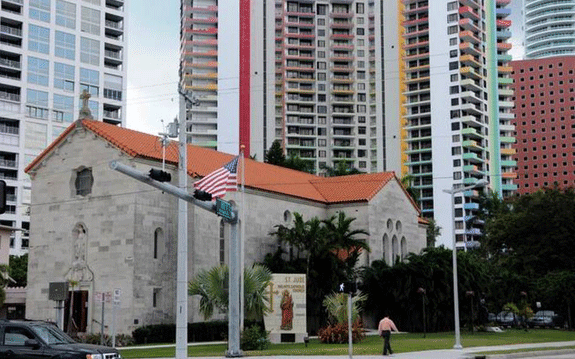Miami City Commissioners voted Thursday evening to declare the 70-year-old St. Jude Melkite Catholic Church on Brickell Avenue a historic building, despite vociferous objections from church leaders and an appeals court ruling that had overturned a previous commission vote.
The contentious battle has divided the church’s congregation. Dozens of parishioners spoke in favor and against the recommendation of city of Miami staff to designate the church at 1501 Brickell Avenue a historic site because of its architectural aesthetics.
“Its architectural significance outweighs its cultural and religious significance,” Megan Cross Schmitt, Miami’s preservation officer, told city commissioners. “It’s a strong example of a Romanesque church.”
The church members supporting the designation have claimed church leaders don’t want St. Jude declared historic because it would make it harder to sell the property’s development rights. However, St. Jude’s bishop Rev. Nicholas J. Samra, church pastor Rev. Damon Geiger, and church attorney Amy Boulris argued that the historic designation would hamper the Greek Catholic parish’s ability to renovate and remodel the church for religious purposes.
“Our primary concern is the burden the historic designation places on religious use,” Boulris said, noting the designation would make it more expensive and more difficult to make renovations to the church that are more in line with Melkite Catholicism.
“The Melkite tradition has prevalent use of domes,” Boulris said. “So one day, if [St. Jude] has the money, they may want to change the dome.” She also warned that the church could lose its insurance or be forced to pay higher premiums if the property is designated historic.
“St. Jude has been advised by an insurance agent that it should be concerned about this,” Boulris said.
Boulris, as well as experts hired by St. Jude, claimed that Schmitt had failed to provide enough evidence to show that the church’s architecture outweighed its religious use.
Built in 1946, St. Jude was originally founded as the Chapel of the Academy of Assumption by the Archdiocese of Miami and served as refugee center for some Cuban exiles in the 1960s, including children who were part of Operation Pedro Pan. The Melkite Greek Catholic Church purchased the property in 1978.
The battle over the historic designation began two years ago when the city commission initially voted in favor of protecting the church building. However in 2014, a panel of 11th Circuit Court judges overruled the city’s historic designation of the church, stating Miami officials used faulty reasoning to conclude the structure had historic value. “The record before us is devoid of any comparative analysis of St. Jude’s religious importance versus its historical and architectural importance,” Judge Miguel de la O wrote. “This failure is fatal under the [city’s] ordinance and compels us to conclude that the city did not follow the essential requirements of the law.”
At the city commission meeting, the church leaders and their attorney argued city staff had not presented any new evidence that would warrant going against the appeals court ruling. “None of this outweighs the religious significance of the church,” Boulris said.
After nearly five hours of debate, city commissioners voted 4 to 1 to redesignate St. Jude a historic building. Commissioner Keon Hardemon was the lone no vote.
